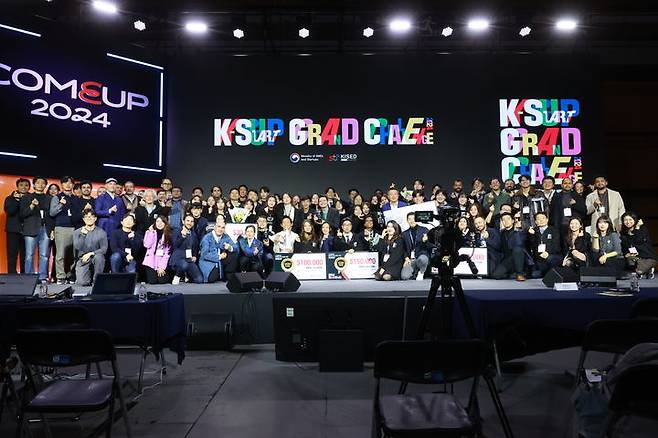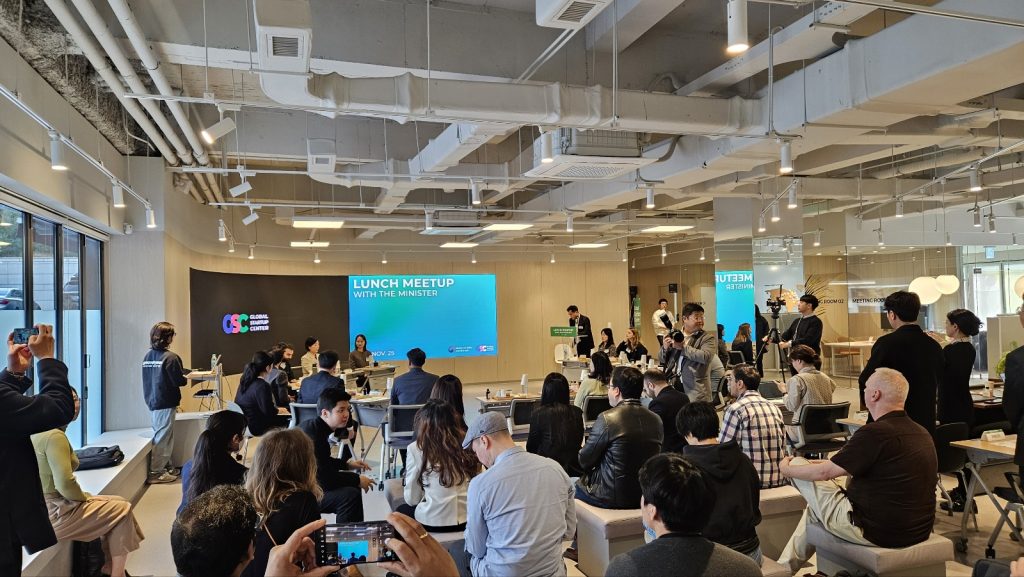Access to the latest Korean startup news and startup database for free

#Weekly Funding Overview
[April. 28~ May. 2]#FUNDING
| Company | Inudustry | Amount | Round | Investors |
|---|---|---|---|---|
| Mingle Lab | Edtech | - | Seed | BonAngels Venture Partners, Seoul National University Holdings |
| Dbd Lab | UX Research Automation Solution | - | Pre Series A | Grand Ventures, SmartStudy Ventures |
| maywrap | Catering DX Platform | - | Pocket Company | |
| Guhada | Cross-border E-commerce | 8.1 billion | Series B Bridge | Korea Development Bank, Colopl Next Korea, Korea Investment Partners |
| Pouch | Pet Insurance | 6 billion | Series A | Signite Partners, Korea Investment Accelerator, HGI, Thanks Ventures |
| Dots Corporation | H&B Startup | 3.2 billion | Pre Series A | Smilegate Investment and Shinhan Investment Securities, Daekyo Investment, CNTTech, Corea cosmedical center |
| BeNow | K-Beauty | 3 billion | CJ OnStyle | |
| Mstoryhub | Content Production | - | Naver Webtoon | |
| LOAS | AI Sound Inspection System | 1 billion | Pre Series A | IBK Venture Investment, FuturePlay |
| Deepqure | Medical Device | - | Series C | Sui Generis Partners |
| Roovook | Hotel/Convention Space Sales Automation Solution | - | Hyundai Investment Partners, Strong Ventures | |
| EVNESS | Power Technology | - | BLT | |
| AquaWorks | Water purification | 500 million | KODIT |
#TREND ANALYSIS
Why Global Startups Are Choosing South Korea
As countries around the world compete to attract high-potential startups, South Korea is actively strengthening its policy framework to lure international entrepreneurial ventures. Over the past decade, Seoul has climbed the ranks to become the 9th best city globally for launching a business, according to Startup Genome.
Recent government initiatives reflect a deepened commitment to this strategy. Authorities have streamlined regulations to ease the entry of global startups while enhancing support systems to ensure a smooth launch and stable operation. These comprehensive efforts include customized incubation programs, expedited visa processes, and the development of a robust startup infrastructure.

A central pillar of this initiative is the K-Startup Grand Challenge (KSGC)—South Korea’s flagship inbound acceleration program designed to help foreign companies enter the Korean market. Since its launch in 2016, the program, based in Pangyo Techno Valley, has provided global startups with key resources such as product and service localization, business matchmaking, and assistance with company incorporation. Participants also receive monthly living stipends and free office space. Top-performing startups at the ComeUp Demo Day are eligible for cash prizes of up to 100 million won.
This year, the KSGC has expanded its reach by doubling the number of accepted participants from 40 to 80 and allowing online participation, thereby lowering entry barriers. Official data shows that since 2016, 195 companies have successfully established a presence in Korea through the program.
Complementing the KSGC is the K-Startup Visa, which primarily assists program participants with relocating to South Korea. It supports applications for both the D-10-2 (job seeker) and D-8-4 (technology startup) visas through the Ministry of Justice-designated Global Startup Immigration Center. Eligibility is assessed using the OASIS point system.
In response to past concerns over strict visa requirements—some of which led to startups exiting the country within a year—the government introduced the Startup Korea Special Visa in 2024. This enhanced version of the D-8-4 visa focuses on key business factors such as innovation potential, market viability, and projected economic impact, rather than rigid criteria like academic credentials or prior investment history.
Infrastructure support for global startups also saw a major boost in 2024 with the launch of the Global Startup Center (GSC) at Yeoksam Tipstown. Designed as a one-stop support hub, the GSC provides office and meeting spaces, translation and interpretation services, assistance with visa applications and renewals (including OASIS visa support), and guidance on company formation. The government envisions the GSC as a cornerstone of its inbound startup strategy, aimed at attracting and anchoring foreign ventures within Korea’s startup ecosystem.

Further reinforcing this ecosystem is the Global Startup Commercialization Support Program, fully launched in 2024 and linked to the GSC. The program offers eligible startups up to 60 million won in commercialization funding, alongside access to GSC services, investment networking opportunities, and collaboration channels with large and mid-sized enterprises—all delivered in English.
Looking ahead, a new innovation hub—tentatively named K Deep Tech Town (Korean Station F)—is set to open near Hongik University in Seoul by 2026. Situated close to major institutions like Yonsei University, Ewha Womans University, and Sogang University, the area boasts Korea’s highest concentration of international students. The new hub aims to create a vibrant startup environment by attracting global companies and leveraging a diverse pool of global talent.


![[StartupRecipe] Physical AI Tops Korean VC Investor Preferences in 2026](https://en.startuprecipe.co.kr/wp-content/uploads/2026/02/260129_Startuprecipe-Investment-Report-_00001-200x140.jpg)
![[StartupRecipe] How Korea’s 10 Early-Stage Investors Performed in 2025](https://en.startuprecipe.co.kr/wp-content/uploads/2026/01/260120_car-racing-desert_ai_5002305-200x140.jpg)
![[StartupRecipe] 85% of Korean Students Use AI, Few Know AI Startups](https://en.startuprecipe.co.kr/wp-content/uploads/2026/01/260118_seoul_ai_00305035523-1-200x140.jpg)
![[StartupRecipe] Korea’s scale-ups are ditching Seoul and here’s why](https://en.startuprecipe.co.kr/wp-content/uploads/2026/01/260107_deep-tech_ai_00000006-200x140.jpg)
![[StartupRecipe] The Rise of U.S.-Based Korean Startups](https://en.startuprecipe.co.kr/wp-content/uploads/2026/01/251229_Aerial-drone-photography_ai_00001-200x140.jpg)